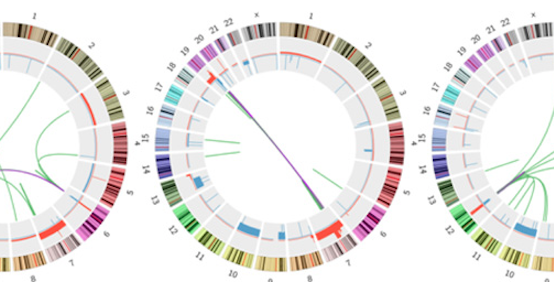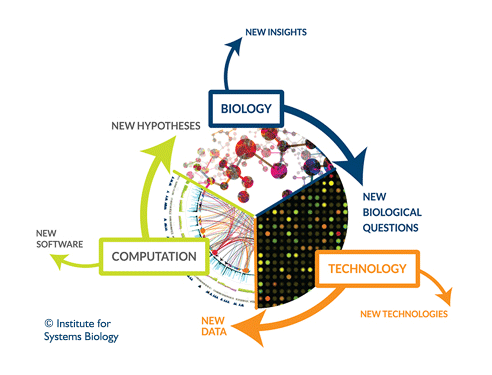In Cancer Research, It’s HOW That Matters
 isbscience.org/news/2014/05/12/in-cancer-research-its-how-that-matters/
isbscience.org/news/2014/05/12/in-cancer-research-its-how-that-matters/
By Martin Shelton, Theo Knijnenburg and Joseph Zhou
ISB Editorial Board Members
The oldest existing record of cancer occurs in a 4000-year-old Egyptian papyrus. It describes, in detail, a woman with symptoms eerily similar to those of modern breast cancer patients. As for the prescribed treatment, there was simply this statement: “No cure.” Sadly, this short and assertive conclusion remains true. According to the American Cancer Society’s annual cancer statistics report, there will be 1,665,540 new cancer patients in 2014 and 585,720 of them will ultimately die of cancer.
President Nixon declared a war on cancer more than 40 years ago and billions of dollars have been poured into cancer research since. Despite the time and resources invested, death rates for most cancers have not declined as significantly or quickly as we all would hope.
In this fight, researchers at Institute for Systems Biology believe the greatest impact will come from how cancers are studied versus which cancers are studied.
Systems Biology is the Key
The systems biology approach to understanding diseases is founded on the simple, profound belief that diseases are systemic disorders that emerge from the dysfunction of one or more networks that subsequently change the levels of the molecules controlled by these “disease-perturbed” networks. The cause of these network dysfunctions can be genetic and/or environmental, and as the disease progresses, the dynamics of the changing levels of the affected proteins should explain the biological mechanisms of the disease. As the changes caused by these disease-perturbed networks percolate throughout the system, they inevitably lead to the systemic dysfunction of multiple other organs.
…diseases are systemic disorders that emerge from the dysfunction of one or more networks…
Two key features characterize the systems biology approach. First, analyses of the disease-relevant organ or cells must be global and dynamic, generating comprehensive data sets (e.g. all mRNA, miRNA, or protein levels) across the disease process. This requires high-throughput, quantitative technologies for data generation. Second, the different levels of biological information (DNA, mRNA, miRNA, protein, interactions, metabolites, networks, tissues, organs, and phenotypes) must be integrated. This requires a deep understanding of disease biology coupled with bioinformatics and robust statistical methods for data integration. The result is a cycle of biological insights and questions that drive the development of improved data-generation technologies that drive the development of more sophisticated data-integration and computational methods, all of which further propels the cycle. 
There are, however, two major challenges associated with analyzing and integrating cancer data: relevance and dimensionality. Identifying the fraction of biological signals that are relevant from billions of data points from global analyses is tremendously difficult. Similarly, the integration of diverse types of biological information leads to enormous data dimensionality that must be reduced in order to identify processes and visualize them for study.
But the cross-disciplinary, holistic, integrative nature of systems biology, makes ISB researchers well-suited to tackle the complexity of cancers.
How ISB Approaches Cancer Research
Detection
With the exception of cancers of the skin and blood, it is difficult to detect cancer by sight or with a routine health screen. The natural variety, or heterogeneity, that exists at the cellular level — even within cells of the same type — challenges our ability to differentiate healthy tissue from diseased. Also, symptoms usually don’t appear until well after a cancer has already developed. Thus, understanding the transition from wellness to disease and the measurable biological characteristics (biomarkers) that change during this transition, is the key to early detection.
Stratification
When a patient receives a diagnosis of breast cancer, it’s a specific subtype of breast cancer, such as invasive ductal carcinoma. Each subtype is characterized by the shape and location of the tumor, its growth progression, prognosis and treatment. The ability to stratify, or group, cancer patients is the first step toward personalized cancer treatment. Whereas traditional stratification is based on examining the tumor tissue, cancer medicine is rapidly moving toward stratification based on the tumor’s molecular makeup. This requires the careful collection and measurement of many thousands of cancer samples and using novel and sophisticated computational approaches to identify relevant groups of samples and biomarkers, integrate that vast amount of data, and visualize it in order gain new insights.
Treatment
Cancer cells are like guerrilla fighters, each with unique strengths, weaknesses and behaviors. As a result, they respond to an attack from a cancer drug in highly variable and often unpredictable ways. Broad-spectrum drugs fail due to this heterogeneity. Many drugs also fail because cancer cells can adapt and develop drug-resistance. We believe it’s necessary to study cancers as systems in order to understand their multiple underlying causes and how cancer cells adapt in extreme environments. We also have to consider new theories that treat cancers as chronic diseases.





